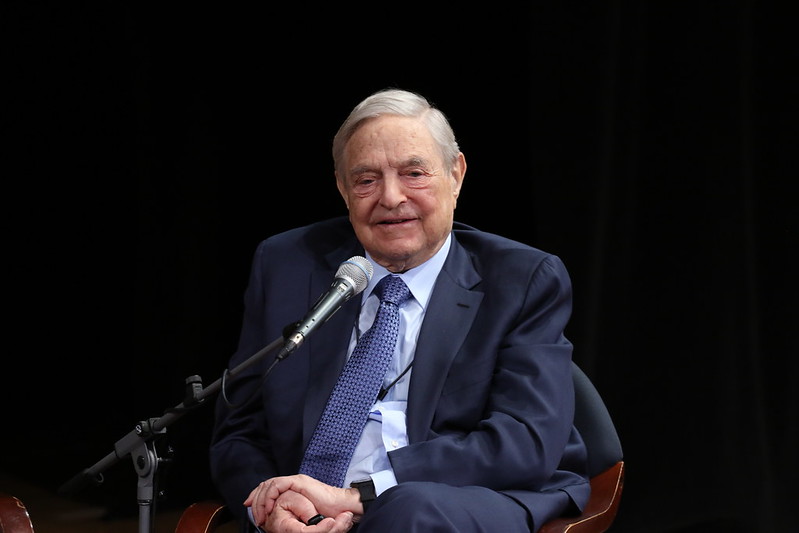In early August, Hungarian Prime Minister Viktor Orbán opened the annual Conservative Political Action Conference (CPAC) in Dallas, Texas. Orbán’s primetime CPAC slot came amid ongoing controversy over a speech he delivered in his home country last month, during which he made comments so extreme — “[Hungarians] do not want to become peoples of mixed-race” — that even one of his veteran advisers quit, accusing him of giving a “pure Nazi speech” that was “worthy of Goebbels.”
Those comments were not too much, however, for CPAC’s organizers, who declined to rescind his invitation. In fact, Orbán was well-received at the conference, with his speech touching on pet far-right issues such as immigration, borders, Christianity, “gender ideology,” and the “traditional” family unit.
He also, as is his wont, included a sizable measure of antisemitism — delivered, as it so often is by the far right these days, as a seething attack on the Hungarian-Jewish financier and liberal philanthropist George Soros. Immediately after sounding the alarm about the fate of “Western Civilization[‘s]… Judeo-Christian heritage,” Orbán warned that Soros “has an army at his service: money, NGOs, universities, research institutions and half the bureaucracy in Brussels.” Soros deploys this army, Orbán continued, “to force his will on his opponents, like us Hungarians.”
An annual event that in recent years has turned into a kind of extreme-right summer camp, CPAC has frequently played host to some of the world’s most infamous and racist figures, with previous invitees including France’s Marion Maréchal-Le Pen; Orbán’s countryman, the alleged neo-Nazi group member and former Donald Trump advisor Sebastian Gorka; and, of course, Trump himself. The fact that Orbán’s speech happened at all, and the conservative embrace of it, reaffirmed the deepening ties between these members of the global far right, as well as the growing uniformity of the movement’s monocultural worldview.

Just as significantly, the event underlined the extent to which far-right antisemitism — so often rendered in dog-whistle references to Soros, which are by now an established plank in GOP messaging, and a chorus that the lobby group AIPAC has recently joined — enjoys the veneer of plausible deniability, largely because of its perpetrators’ avowal of their commitment to the state of Israel. And the Israeli far right itself is all too happy to be associated with the CPAC brand: this year, the conference added Tel Aviv to its growing list of international conference locations.
Back in Dallas, meanwhile, one of Orbán’s most enthusiastic admirers was his fellow speaker Yishai Fleisher, the international spokesperson for Hebron’s Jewish community. Tweeting a selfie with the prime minister at the conference, Fleisher called Orbán “a modern hero of nationalism… and [an] ally of Israel.” Responding to pushback about Orbán’s antisemitism, Fleisher shot back: “I am not looking at Hungary as a Hungarian Jew or a Diaspora Jew, I’m looking at it as an Israeli Jew — a fellow sovereign. And from this nationalalist [sic] perspective nation states must unite against the globalist agenda which seeks to force open borders & erase national identities.”
At @CPAC #DALLAS: GREAT meeting with modern hero of nationalism, leader in the defense of Europe against Jihadist emigration, and ally of Israel – #Hungary PM Viktor Orbán@abouthungary @BalazsOrban_HU pic.twitter.com/3SMBzJMuB6
— Yishai Fleisher يشاي ישי פליישר ???? (@YishaiFleisher) August 4, 2022
For Jelena Subotić, a political scientist who also works in memory studies, the Israeli right’s embrace of Orbán’s message — which has included chummy meetings with ex-Israeli prime ministers Benjamin Netanyahu and Naftali Bennett — is not as baffling as it may seem. Rather, Subotić explains, it is a function of how “far-right populist international networks are changing our traditional understanding of antisemitism, in that they’re decoupling from attitudes toward and relations with Israel.”
This separation, she says, is the key factor that distinguishes modern far-right antisemitism from its earlier forms — and which has helped ensure that antisemitism remains the ideological core of global far-right populism, even as its adherents insist otherwise by way of their pro-Israel bona fides. This “decoupling,” and the “pro-Israel antisemitism” it has cultivated, also help explain why Soros continues to dominate far-right conspiracy theories, and why such antisemitic flights of fancy have taken root in Israel as much as in Europe and the United States.
I spoke to Subotić about why Orbán continues to be at the forefront of international conservatism; the ongoing fixation with Soros; and why antisemitism and pro-Israel sentiment seem to coexist so comfortably on the far right. The following conversation has been edited for length and clarity.
Let’s start out with CPAC, which took place in Dallas earlier this month with a star appearance by Viktor Orbán, who opened the proceedings. Can you explain why he’s such a darling of the global far right?
He’s the darling of the far right mainly because he is perceived as a success story. He’s not on the margins, or someone who has a paramilitary group, or on the fringes of a political party — he is a successful, re-elected prime minister of a major European country. That’s something all of these [far-right] movements always wanted — to get power. This is what Marine Le Pen in France, for example, has been trying to accomplish for decades. She’s getting closer every year, but she has not managed to capture the state like Orbán has.
Orbán’s electoral success has also meant that he’s been able to implement very far-right policies as law in Hungary — banning LGBT education; closing down the Central European University because he wanted to ban the teaching of feminism and close down the Gender Studies Department; suppressing the media; [trying to] register NGOs similarly to how [Russian President Vladimir] Putin did, and saying that anyone who gets a foreign grant is a spy or an enemy of the state.
All of these policies appeal to the far right — they’re very ethnic in nature, very nationalistic, anti-feminist, anti-gender, anti-LGBT, very Christian. And Orbán has put them all in place in Hungary, while also creating this network of like-minded politicians and parties in the EU. His party belongs to a cluster in the European parliament called the European People’s Party (EPP), which brings together right-of-center and far-right European parties to influence the EU from within. So it’s kind of a Trojan Horse in this perceived degenerate, European, liberal, cosmopolitan entity.
In a recent paper you published on the continuing role of antisemitism as an anchoring ideology of the global far right, you write that “the biggest point of departure of contemporary far-right antisemitism from its earlier manifestations — [is] the growing decoupling of attitudes towards Israel from antisemitism against diaspora Jews, the pro-Israel policies of otherwise antisemitic populist parties and movements, and their embrace by Israel.” What do you see as the root of what you call “pro-Israel antisemitism,” and can you put it into context in terms of the praise Orbán received from an Israeli settler leader at CPAC?
There are a few reasons why [far-right] parties have a favorable attitude toward Israel. The first one is very cynical: that if they get support from Israel, it covers them for charges of antisemitism. So some of it is purely transactional: “We’re going to be friends with Israel, and then no one can accuse us of being antisemites.” That works really well for all of these groups, and it’s sort of like how [Donald] Trump says, “My daughter married a Jew [Jared Kushner], so I’m not an antisemite,” but at a [national] level.
The second one is that they bond over Islamophobia. They perceive Israel as being a very militaristic country that is successfully dealing with their “Muslim threat,” and this is something they would like to introduce in their own countries so they can address what they see as their own “Muslim threat.” They admire how Israel doesn’t care about being perceived as Islamophobic.
Another aspect brings us to that tweet [by Yishai Fleisher]: they bond over the idea of what a nation-state should be, and over their strong feeling that nationalism is a good thing, and multiculturalism a bad thing. That’s why American conservatives, including CPAC, like them as well. This is the common language they understand: nations should have their own states; the state and the nation are one; there should be one state religion (and they don’t care that it’s Judaism in Israel); and enemies of this view of nationalism need to be eliminated — the “globalists,” the cosmopolitans, the multinationals, the multiculturals, the diaspora, the gays, the feminists.
There’s also something to be said about how all this is undergirded by a certain form of antisemitism. I think we can bluntly say that leaders of Hungary or Poland are perfectly fine with Israel, because then Jews can just go over there, and not bother them in Budapest or in Warsaw, so they don’t have to deal with integrating whatever’s left of the Jewish communities in their countries.
I’d also throw in that this admiration on the Israeli side is partly fed by the determination not to be “the Jew” that is the subject of antisemitism. It’s a way of assimilating into Western masculinity.
Yes. I don’t work deeply on this history, but it’s partly also [down to] the different construction of what an Israeli Jew is versus what a diaspora Jew is: someone who’s uber-masculine and a fighter, versus someone who’s weak, and pathetic, and who’s “messing us up” and bringing all these immigrants. That seems to be a theme, especially among the American antisemitic far right, like the Pittsburgh synagogue shooter — that Jews are undermining our national body.
Right. They’re the ones who still transgress borders, while Israeli Jews know what borders are and respect them.
Yes, exactly.
Someone who’s been at the center of much of that conspiracy-mongering about immigrants is George Soros. He’s been, for a number of years now, a dominant figure and favored villain in the global far-right imaginary from Hungary to Israel. Why has he become such a convenient shorthand for all the conspiracy theories and culture wars the global far right use to activate their base, and what does that tell us about modern political antisemitism?
I should tell you first of all, as an ethical disclaimer, that I was a project manager for one of George Soros’ Open Society Foundations back in the 1990s.
Soros, as himself, is not particularly important to this narrative. I think he’s a symbol in the way that the Rothschilds are, the way [Alfred] Dreyfus was. When I get antisemitic hate mail, they’ll say, “You worked for Soros, so you worked for Rothschild” — they don’t know the difference. So it’s become a noun in the antisemitic universe. Every 50 years there’s a new figure who captures the imagination of what it means to be this “menacing, globalist Jew.”

Additionally, the direct threat [Soros] represents, and why a lot of the ire is specifically addressed against him, is that he’s a progressive. He has tried to change societies after communism, and the work was to support civil society, human rights, LGBTQ groups, higher education, and to send promising students to get a whole class education in the region so that they don’t have to go to the U.S. or the U.K. All these things — which I continue to think are admirable, because that’s my worldview — are seen as huge threats, because they are introducing liberal ideologies to very conservative societies. So [the far right] doesn’t like the agenda or the politics. It’s the same in the United States: Soros is a big Democratic donor, so on those merits alone, he’s seen as an enemy.
His Jewishness feeds into that same old narrative of, “there’s this foreigner, we don’t know who he is, he’s Hungarian, he’s American, he’s British, he speaks with an accent” — along with this insane theory that he was a Nazi as a nine-year-old. That all feeds into this mythology about this lurking rich person who is somehow meddling in the affairs of the nation, which is a very long-standing antisemitic trope about globalist, shady, slippery figures. [Hungarians] talk about how he has an accent, [and question] whether he’s Hungarian, and they can’t really pin him down. And he’s somehow an intruder into domestic national politics, and [the accusations] are that he’s bringing immigrants in, and brainwashing children to believe in LGBTQ ideology, and all the things they say.
[Soros is] also very visible and open. The Koch brothers, for example, who are the conservative equivalent in the United States, [rarely] give interviews. But Soros has written books and spoken very publicly about what he wants to do. He has pledged to pay however many millions of dollars to get guns out of schools. There’s a lot for [the far right] to attack and focus their anger against.
So [the fixation with Soros] is just the latest manifestation of this threat of an outsider who is reshaping your society in the opposite way of how you think it should be done. And once you have that antisemitic, conspiratorial mindset as a basis, this is just an addition — it’s the latest iteration of what comes in cycles all the time. It’s actually very sad — Soros, who’s rather old now, said in a recent interview how sad it is for him to end his life like this. He’s worked all his life to get something done, and in his last years, things are actually worse than when he started.
Speaking of historical backsliding, you wrote in your book “Yellow Star, Red Star” about “memory solidarity,” which is when groups “acknowledge, remember, and care for the memory of others as a foundation for building a more just society.”
With that in mind, I’m going to read you a quote from a speech Benjamin Netanyahu made in 2018 during a renaming ceremony at a nuclear research center. “In the Middle East, and in many parts of the world,” he said, “there is a simple truth: There is no place for the weak. The weak crumble, are slaughtered and are erased from history while the strong, for good or for ill, survive.”
Oof. Okay.
This obviously plays into a narrative about Holocaust victims that has been present in Israeli society since the country’s founding, which shames them for supposedly going “like sheep to the slaughter.” But I’m also interested in what you make of that statement in the context of your research on both Holocaust memory, and what you’ve written in your most recent paper on how diaspora Jewish communities are threatened by Israel supporting antisemitic politicians — provided they’re pro-Israel.
Memory solidarity is the ability to consider and remember the pain and suffering of others as part of your own, to reserve your remembrance not only for your own victimization but for other victims as well, including victims of your own regimes. Memory solidarity is the exact antithesis to nationalism, which is solely focused on the needs and interests of your own nation to the detriment of others. It is not surprising that far-right nationalists are not going to engage in memory solidarity — that would mean acknowledging that other groups matter equally to their own. Not only that, but the suffering of others is the point: achieving your nationalist goals means inflicting pain and suffering on others. That is the language that Orbán, the American far right, and the Israeli far right understand and share.

I’m always reminded of some of my Jewish friends in the diaspora who say that the prime minister of Israel is making their lives and the lives of their children less safe. Which is a shocking place to land, but I think it’s true. I’m not a Bibi specialist, but looking at it from my vantage point — a diaspora Jewish, East European perspective — it’s obviously playing into all the stereotypes we mentioned about Jews in the diaspora being weak, [who] didn’t know what was good for them, and never fought, and if only they’d fought, things would have been different. And that’s why we have Israel, because Israel is going to protect us.
I also think [Netanyahu’s remarks] play into why Bibi really liked people like Orbán, and probably Putin, and probably a lot of these other dictators. From his perspective and his foreign policy goals — and I think this goes beyond just Bibi — it doesn’t really matter what happens to diaspora Jews. If they’re complaining, if they’re being victimized, who cares? [Israeli politicians] care about foreign policy, about the interests of Israel, especially as it relates to the Palestinian issue. So as long as Hungary, Poland, Brazil, the United States under Trump, etc, are going to vote against Palestinian statehood, and are always going to vote in favor of whatever Israel wanted in the UN, who cares what the Jews left over in Kraków are complaining about? They’re not [Israel’s] constituents, they’re just some people who live “over there.”
That also partly explains the real rift between American Jews and Israel, particularly younger Jews who just can’t take this anymore. It’s coming from Israel as well, because they don’t think they need American or other diaspora Jews anymore. As Bibi said at the nuclear facility, Israel is so strong that they don’t care what we in the diaspora have to say about them. I think that’s very short-sighted, and that making the vast Jewish diaspora angry, disassociated, and disinterested is not smart politics, even just from a geopolitical realist perspective.
There’s also something about this long tradition of building the State of Israel on this masculine, warrior mythology that is not just partly historically inaccurate, but also explains so much of the narrative and justification for Israel’s aggressive politics. Your national identity and your view of yourself have become so engrained with this idea that you are strong, that you don’t take prisoners, that any concession or negotiation, or integration or multiculturalism, is weakness and will inevitably bring demise, just as it did in the Holocaust. And that’s creating such a rift between the diaspora and Israel.

What are some misapprehensions about far-right antisemitism that you see in mainstream reporting? And do you think there are stories that reporters and researchers are missing?
There’s still a lack of understanding, among a lot of the public, that diaspora Jews are not the same as Israel. If you criticize Israel, you’re not antisemitic. I see articles and reporting about antisemitic attacks in Hungary, and the article will say, “which is very strange, because Orbán is a supporter of Israel.” Actually, that’s not very strange at all, it makes perfect sense. So [there needs to be] decoupling. You can be a huge fan of Israel and an antisemite, or you can be very pro-Jewish and anti-Israel.
There are all sorts of combinations there, and I think people who don’t go into as much depth as you and I just have would look at attitudes toward Israel as a proxy for understanding what’s going on in society. That’s really wrong, because as we just talked about, [positive] attitudes toward Israel can be a cover for real, deeply-rooted antisemitism. So these two things need to be parsed out and not used to be able to say, “this is not an antisemitic country because they always vote with Israel in the UN.” Those are two separate issues.
There’s a real insecurity about talking about antisemitism as well. People don’t quite know what it means, and they’re afraid that if they accuse someone of antisemitism they’ll get blowback. For example, Theresa May, [then-] prime minister of the U.K., gave a pro-Brexit speech where she said that people who are anti-Brexit want to be “citizens of nowhere.” [May’s full quote was, “if you believe you’re a citizen of the world, you’re a citizen of nowhere. You don’t understand what the very word ‘citizenship’ means.” – NRR.] To me, that read as antisemitic.
It’s important to pay attention to the role of language and discourse — this kind of language about globalism, rootless cosmopolitans, being a citizen of nowhere, not paying attention to your own nation. This all has a long history, and people who are antisemites, including those on the British far right who are pro-Brexit, know what it means. We should not be afraid to point this out, and it also stands for antisemitism on the left. During the whole Jeremy Corbyn saga I heard a lot of antisemitic phrasing, and I’d get into arguments with friends who would insist he wasn’t an antisemite. And I would say that it doesn’t matter — there’s a milieu around this narrative in the U.K. that uses antisemitic tropes, and that’s important to call out.



